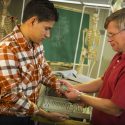Self-study course assists those planning for retirement
As Judy Ettinger puzzled over her retirement options a few years ago, her 30-plus years of experience in career counseling and career development proved to be invaluable.
Ettinger, now an emerita senior outreach specialist at the Center on Education and Work (CEW) at the University of Wisconsin–Madison, also spoke with others facing this significant transition in their lives and found that many of them had become confused over how they should prepare.
The available literature on retirement planning, which focuses mostly on money and medical concerns, doesn’t cover the full range of issues someone approaching retirement should consider, she says. So she hatched the idea of creating a course that helps people address the pressing question “What am I going to do with the rest of my life?”
As result, CEW recently launched “Planning for Retirement: Exploring Your Career and Leisure Options,” an online, independent-study course using the university’s Learn@UW Web site.
According to the stereotypical view, retirement involves ceasing to work and going off, for example, to travel and visit the grandkids. Today, however, baby boomers reaching that stage in their lives have more options, Ettinger says. And they don’t necessarily stop working.
“People are appreciating the fact that careers go on, sometimes until the very end of their lives,” she says.
As she approached retirement, Ettinger says, “I thought about working in a whole new field, but realized I would be happiest taking the parts I loved of the job that I was already doing and focusing on those aspects.”
While she continues to work at CEW, she adds, “I’m working differently now.”
Ettinger, who has designed and taught career-related courses that are delivered online, created a retirement-planning course that can assist individuals regardless of what type of work they do or where they reside. She says the program is best suited for individuals who are interested in self-study and reflection and are sufficiently comfortable working online.
The structured program, with a series of 18 units, guides individuals through the retirement-planning process and helps them address such issues as:
- How much should you work, or should you work at all?
- What are your interests, values and skills? Which of these do you want to pursue?
- Do you want to do something different from what you’ve done before? Do more of what you’ve already done? Work in the same field in a different way?
- How will you go about networking, transitioning and re-balancing?
Course topics include exploring your personality characteristics, work values and skills; decision-making style; marketing yourself; considering external factors; and accessing alternative sources of career information. The program includes two personal career-counseling sessions, by phone or in person, with a qualified career facilitator.
“The key is how people take what they love into the future,” Ettinger says. “How do you leave what you’ve been doing and find something that’s equally as satisfying or even more so?”
Participants may join the course at any time, and will have six months to finish. During the pilot study in developing the course, Ettinger found that participants varied in their needs for engagement and guidance, so the course is designed to be flexible.
Each registrant is assigned to an instructor, who responds to assignments and online postings. The discussion board on the Learn@UW site provides an online place to interact with the instructor and other participants. Participants also may communicate privately with the instructor via e-mail.
Those who complete the course will be able to continue exchanging thoughts and experiences through an alumni discussion group or blog.
Ettinger hopes that each person who takes the course ultimately discovers that kernel of self-information that proves invaluable heading into this phase of life.
Details about “Planning for Retirement: Exploring Your Career and Leisure Options,” including registration information, are available here.
Tags: learning, outreach, School of Education

